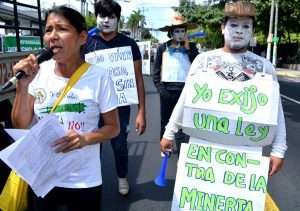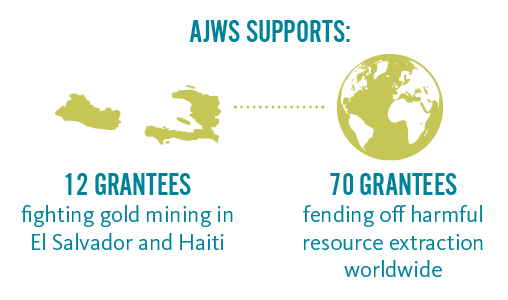Stopping a poisonous gold rush in El Salvador and Haiti

de Desarrollo Económico Social, Santa Marta
In El Salvador last year, a group of local farmers proved that water is more valuable than gold. The situation was dire: An upswing in gold mining had poisoned the water supply and caused dramatic increases in cancer and kidney disease.
Twelve grassroots groups organized thousands of local people to pressure the government to intervene. AJWS’s in-country team supported and guided the network to organize and grow. After eleven years of advocacy, court cases, and incremental victories, the farmers won a government ban of all metal mining in 2017. El Salvador is the first nation ever to pass such a law.
And now, the Salvadoran activists are using their experience to advise and inspire a new movement in Haiti, where the threat of gold mining is looming.
“We consider AJWS a sister organization and strategic ally. The achievement we have had to ban metallic mining in El Salvador is also thanks to your support.” —Saul Baños, human rights lawyer and director of FESPAD, a member of the Salvadoran mining movement
Haiti sits on considerable gold deposits, and international mining companies have been spending millions to position themselves to cash in on a coming mining boom. But if mining begins in Haiti, it would come at a catastrophic cost. Haiti’s gold deposits follow the same fault that caused the massive earthquake that killed hundreds of thousands of people in 2010. Releasing the gold would require vast amounts of poisonous cyanide, held in collecting pools that are far from earthquake-proof. Mining gold along a fault line—and in a country also prone to hurricanes—poses an extreme risk that the deadly chemical would contaminate the surrounding land and water supply.
In 2013, with support from AJWS, Haitian activists and AJWS’s in-country consultant launched Kolektif Jistis Min (the Mining Justice Collective)—which AJWS now funds—to fend off mining. Crucially, AJWS connected them with leaders of the Salvadoran mining movement and others in the region to help the Haitian activists strategize and build their campaign. In 2016, the collective held “10 days of action on mining,” involving representatives from mining justice movements in more than 11 countries.
In 2018, Haiti’s mining activists are preparing for the long battle won by their Salvadoran neighbors and allies. They are mobilizing opposition, holding community meetings, engaging the media, and protesting to let the Haitian state and mining companies know that they will not allow metal mining in their communities. Peterson Derolus, co-coordinator of the Haiti Mining Justice Collective, says, “Agriculture, land, and water are the foundations of our life. We cannot permit mining companies to destroy this life.”
Our grantees are working to stop mining in Haiti before it starts—something that has never before happened in any country. They have the courage to pursue this ambitious goal thanks to the support of their colleagues around the world and the momentum gained by those who came before them.
Read more of our annual report
Feature photo courtesy of the Mining Justice Collective


